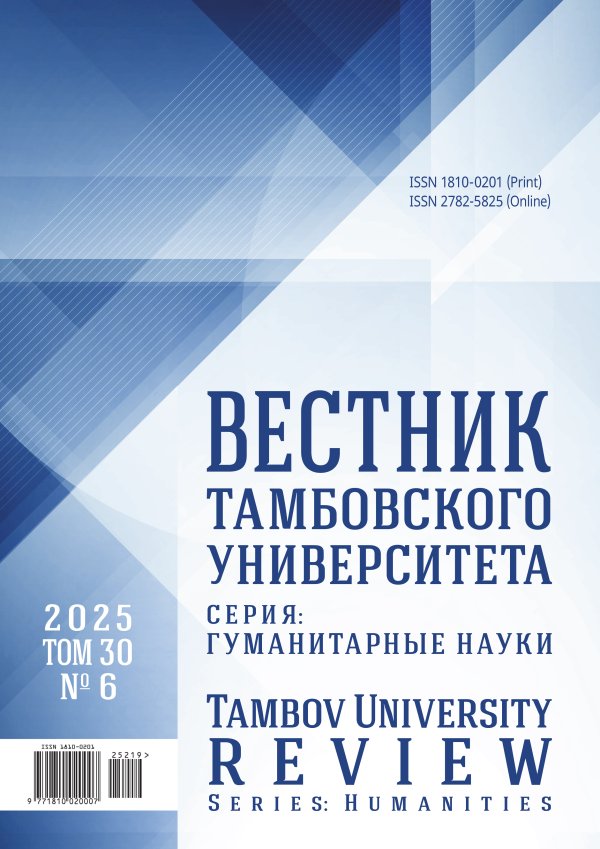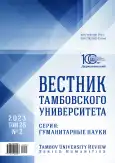Создание системы упражнений обучения иностранному языку с применением ИКТ
- Авторы: Мурунов С.С.1
-
Учреждения:
- ФГБОУ ВО «Тамбовский государственный университет им. Г.Р. Державина»
- Выпуск: Том 28, № 2 (2023)
- Страницы: 362-376
- Раздел: ТЕОРИЯ И МЕТОДИКА ОБУЧЕНИЯ ИНОСТРАННОМУ ЯЗЫКУ
- URL: https://journal-vniispk.ru/1810-0201/article/view/297991
- DOI: https://doi.org/10.20310/1810-0201-2023-28-2-362-376
- ID: 297991
Цитировать
Полный текст
Аннотация
Актуальность. Современные учебные средства привносят изменения в структуру курса изучения иностранного языка, по-иному раскрывая способы создания учебных задач и контроля их выполнения. Однако перечень информационно-коммуникационных технологий трудно поддается определению из-за многообразия.Цель исследования – выявление взаимозависимости между ИКТ средствами обучения и системой упражнений обучения иностранному языку.Материалы и методы. Объектом исследования явилось применение ИКТ для проектирования учебного процесса. В качестве методов исследования использовался анализ актуальной методической литературы и обобщение педагогического опыта применения ИКТ для обучения иностранным языкам. Предложенная типология включает в себя три основных класса упражнений, которые, в свою очередь, делятся в дальнейшем на типы: класс языковых упражнений (фонетический, лексический, грамматический), класс условно-речевых (чтение, письмо, слушание, говорение) и класс речевых (когнитивный, коммуникативный, культурологический). Каждый приведенный тип был рассмотрен с позиций возможности интеграции цифровых средств обучения.Результаты исследования. Способ представления учебных материалов привносит новые качества учебного процесса. Среди них можно выделить: больше возможностей для организации фонетических заданий из-за доступности мультимедийных файлов, синхронную модерацию процесса создания письменного текста, увеличение способов контекстуализации условно-речевой и речевой деятельности, повышенную эргономичность координации субъектов обучения.Выводы. Полученные результаты могут быть использованы при создании системы упражнений в цифровой среде. Дальнейшие исследования могут быть направлены на разработку конкретных типологий, дифференцирующихся по используемым в них ИКТ средствам.
Об авторах
С. С. Мурунов
ФГБОУ ВО «Тамбовский государственный университет им. Г.Р. Державина»
Автор, ответственный за переписку.
Email: sergeymurunov@gmail.com
ORCID iD: 0000-0002-1346-3640
ассистент кафедры лингвистики и лингводидактики
392000, Российская Федерация, г. Тамбов, ул. Интернациональная, 33Список литературы
- Сысоев П.В., Юзбашева Э.Г. Формирование грамматических навыков речи студентов на основе реализации иноязычных интернет-проектов // Язык и культура. 2022. № 57. С. 258-273. https://doi.org/10.17223/19996195/57/13, https://elibrary.ru/tiswlm
- Титова С.В. Оценивание проектных заданий в предметно-языковом интегрированном курсе: этапы, формы, онлайн-инструменты // Высшее образование в России. 2022. Т. 31. № 2. С. 94-106. https://doi.org/10.31992/0869-3617-2022-31-2-94-106, https://elibrary.ru/hwytud
- Харламенко И.В., Фролова Л.В. Экзамен в электронном формате: преимущества, недостатки, возможные перспективы использования // Вестник Московского университета. Серия 19: Лингвистика и межкультурная коммуникация. 2020. № 4. С. 168-175. https://elibrary.ru/wvqyeb
- Коршунова Е.С. Совершенствование произносительных навыков студентов при обучении английскому языку в неязыковом вузе // Педагогика. Вопросы теории и практики. 2022. № 7 (11). С. 11671175. https://doi.org/10.30853/ped20220190, https://elibrary.ru/lgtigw
- Виторович М.Р. Обучение фонетическому аспекту РКИ на начальном этапе в условиях дистанционного обучения // Балтийский гуманитарный журнал. 2021. Т. 10. № 1 (34). С. 51-53. https://doi.org/10.26140/bgz3-2021-1001-0011, https://elibrary.ru/ncwkzw
- Пашковская Н.Д., Магдеева А.Р. Формирование лексического навыка при обучении иностранному языку студентов юридической специальности // Проблемы современного педагогического образования. 2022. № 74-4. С. 193-196. https://elibrary.ru/yvixdy
- Куницына О.М. Опыт формирования лексических навыков в условиях смешанного обучения // Вестник Московского государственного лингвистического университета. Образование и педагогические науки. 2022. № 3 (844). С. 60-69. https://doi.org/10.52070/2500-3488_2022_3_844_60, https://elibrary.ru/xmrsun
- Королева Е.В., Леонтьев М.С. Использование образовательной системы moodle в обучении грамматической стороне речи студентов // Проблемы современного педагогического образования. 2021. № 72-1. С. 162-164. https://elibrary.ru/pgnqqn
- Асонова Г.А. Цифровая образовательная среда и ее роль при обучении видам глагола студентовиностранцев // Преподаватель ХХI век. 2022. № 2-1. С. 226-244. https://doi.org/10.31862/2073-96132022-2-226-244, https://elibrary.ru/bebkdt
- Джененко О.В. Лингводидактический потенциал аутентичных видеоресурсов в формировании профессиональной иноязычной аудитивной компетенции в области международного туризма // Педагогика. Вопросы теории и практики. 2020. № 5 (2). С. 170-175. https://doi.org/10.30853/pedagogy.2020.2.7, https://elibrary.ru/gokuvo
- Лебедева Е.А. К вопросу об обучении ознакомительному чтению на иностранном языке в электронных сетевых источниках информации // Гуманитарные науки. Вестник Финансового университета. 2022. Т. 12. № S1. С. 80-83. https://doi.org/10.26794/2226-7867-2022-12-c-80-83, https://elibrary.ru/oxgpow
- Сысоев П.В., Мерзляков К.А. Использование метода рецензирования в обучении письменной речи обучающихся на основе блог-технологии // Вестник Московского университета. Серия 19: Лингвистика и межкультурная коммуникация. 2017. № 1. С. 36-47. https://elibrary.ru/ygcpxj
- Коновалова О.В. Методические аспекты развития умения говорения студентов факультета иностранных языков при смешанном формате обучения // Вестник Тамбовского университета. Серия: Гуманитарные науки. 2022. Т. 27. № 4. С. 988-998. https://doi.org/10.20310/1810-0201-2022-27-4-988-998, https://elibrary.ru/ohevqb
- Николаенко И.С., Прибыткова А.А., Пустовалова О.В. Использование проектной методики в обучении иностранному языку студентов языковых направлений подготовки // Вестник Тамбовского университета. Серия: Гуманитарные науки. 2021. Т. 26. № 192. С. 24-32. https://doi.org/10.20310/18100201-2021-26-192-24-32, https://elibrary.ru/fmnbow
- Кочарян М.А. Проблемно-аксиологический подход к обучению студентов иноязычной речевой деятельности // Вестник РГГУ. Серия: Литературоведение. Языкознание. Культурология. 2021. № 10-2. С. 250-258. https://doi.org/10.28995/2686-7249-2021-10-250-258, https://elibrary.ru/dhrtdl
- Яшина М.Е., Закирова Л.Р. Технология проблемного обучения старшеклассников иностранному языку на современном этапе // Проблемы современного педагогического образования. 2022. № 76-1. С. 338-341. https://elibrary.ru/xlpdzp
- Сысоев П.В., Токмакова Ю.В. Разработка методики предметно-языкового интегрированного обучения студентов аграрного вуза // Перспективы науки и образования. 2022. № 1 (55). С. 221-235. https://doi.org/10.32744/pse.2022.1.14, https://elibrary.ru/edzmxp
- Сысоев П.В. Задания на культурную рефлексию в рамках проблемных культуроведческих заданий // Вестник Томского государственного университета. 2004. № 282. С. 279-284. https://elibrary.ru/oiveed
- Мурунов С.С., Медведев Н.В., Шульц О.Е. Использование интернет-ресурсов для проблематизации обучения иностранным языкам // Вестник Тамбовского университета. Серия: Гуманитарные науки. 2022. Т. 27. № 4. С. 911 -922. https://doi.org/10.20310/1810-0201-2022-27-4-911-922, https://elibrary.ru/mahtcx
- Воеводская Е.А. Веб-квест как средство формирования универсальных и профессиональных компетенций у будущих учителей иностранного языка // Вестник Костромского государственного университета. Серия: Педагогика. Психология. Социокинетика. 2021. № 27 (1). С. 205-208. https://doi.org/10.34216/2073-1426-2021-27-1-205-208, https://elibrary.ru/yfxjtj
Дополнительные файлы









